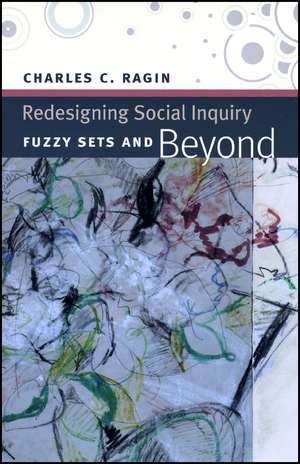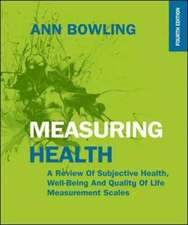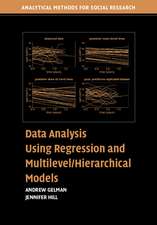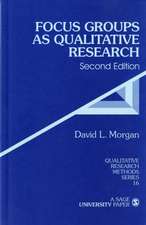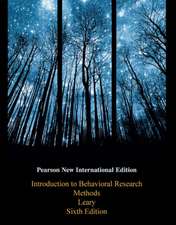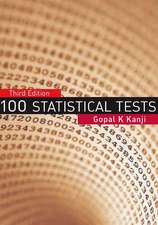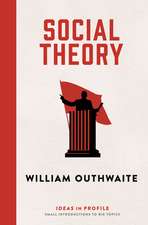Redesigning Social Inquiry: Fuzzy Sets and Beyond
Autor Charles C. Raginen Limba Engleză Paperback – 18 sep 2008
For over twenty years Charles C. Ragin has been at the forefront of the development of innovative methods for social scientists. In Redesigning Social Inquiry, he continues his campaign to revitalize the field, challenging major aspects of the conventional template for social science research while offering a clear alternative.
Redesigning Social Inquiry provides a substantive critique of the standard approach to social research—namely, assessing the relative importance of causal variables drawn from competing theories. Instead, Ragin proposes the use of set-theoretic methods to find a middle path between quantitative and qualitative research. Through a series of contrasts between fuzzy-set analysis and conventional quantitative research, Ragin demonstrates the capacity for set-theoretic methods to strengthen connections between qualitative researchers’ deep knowledge of their cases and quantitative researchers’ elaboration of cross-case patterns. Packed with useful examples, Redesigning Social Inquiry will be indispensable to experienced professionals and to budding scholars about to embark on their first project.
Redesigning Social Inquiry provides a substantive critique of the standard approach to social research—namely, assessing the relative importance of causal variables drawn from competing theories. Instead, Ragin proposes the use of set-theoretic methods to find a middle path between quantitative and qualitative research. Through a series of contrasts between fuzzy-set analysis and conventional quantitative research, Ragin demonstrates the capacity for set-theoretic methods to strengthen connections between qualitative researchers’ deep knowledge of their cases and quantitative researchers’ elaboration of cross-case patterns. Packed with useful examples, Redesigning Social Inquiry will be indispensable to experienced professionals and to budding scholars about to embark on their first project.
| Toate formatele și edițiile | Preț | Express |
|---|---|---|
| Paperback (1) | 176.44 lei 3-5 săpt. | +11.34 lei 10-14 zile |
| University of Chicago Press – 18 sep 2008 | 176.44 lei 3-5 săpt. | +11.34 lei 10-14 zile |
| Hardback (1) | 563.24 lei 3-5 săpt. | +18.47 lei 10-14 zile |
| University of Chicago Press – 13 noi 2008 | 563.24 lei 3-5 săpt. | +18.47 lei 10-14 zile |
Preț: 176.44 lei
Nou
Puncte Express: 265
Preț estimativ în valută:
33.76€ • 35.34$ • 27.94£
33.76€ • 35.34$ • 27.94£
Carte disponibilă
Livrare economică 15-29 martie
Livrare express 04-08 martie pentru 21.33 lei
Preluare comenzi: 021 569.72.76
Specificații
ISBN-13: 9780226702759
ISBN-10: 0226702758
Pagini: 240
Ilustrații: 11 line drawings, 33 tables
Dimensiuni: 140 x 216 x 20 mm
Greutate: 0.3 kg
Editura: University of Chicago Press
Colecția University of Chicago Press
ISBN-10: 0226702758
Pagini: 240
Ilustrații: 11 line drawings, 33 tables
Dimensiuni: 140 x 216 x 20 mm
Greutate: 0.3 kg
Editura: University of Chicago Press
Colecția University of Chicago Press
Notă biografică
Charles Ragin is professor of sociology and political science at the University of Arizona. He is the author of Fuzzy-Set Social Science and The Comparative Method: Moving Beyond Qualitative and Quantitative Strategies.
Cuprins
Acknowledgments
Introduction
Part I. Set-Theoretic versus Correlational Connections
Chapter 1. Set Relations in Social Research: Basic Concepts
Chapter 2. Fuzzy Sets and Fuzzy-Set Relations
Chapter 3. Evaluating Set Relations: Consistency and Coverage
Part II. Calibration versus Measurement
Chapter 4. Why Calibrate?
Chapter 5. Calibrating Fuzzy Sets
Part III. Configurations of Conditions versus “Independent” Variables
Chapter 6. Configurational Thinking
Chapter 7. Configurational Analysis Using Fuzzy Sets
and Truth Tables
Part IV. Analysis of Causal Complexity versus Analysis of Net Effects
Chapter 8. Limited Diversity and Counterfactual Cases
coauthored with John Sonnett
Chapter 9. Easy versus Difficult Counterfactuals
Chapter 10. The Limitations of Net Effects Thinking
Chapter 11. Net Effects versus Configurations: An Empirical
Demonstration
coauthored with Peer Fiss
References
Index
Introduction
Part I. Set-Theoretic versus Correlational Connections
Chapter 1. Set Relations in Social Research: Basic Concepts
Chapter 2. Fuzzy Sets and Fuzzy-Set Relations
Chapter 3. Evaluating Set Relations: Consistency and Coverage
Part II. Calibration versus Measurement
Chapter 4. Why Calibrate?
Chapter 5. Calibrating Fuzzy Sets
Part III. Configurations of Conditions versus “Independent” Variables
Chapter 6. Configurational Thinking
Chapter 7. Configurational Analysis Using Fuzzy Sets
and Truth Tables
Part IV. Analysis of Causal Complexity versus Analysis of Net Effects
Chapter 8. Limited Diversity and Counterfactual Cases
coauthored with John Sonnett
Chapter 9. Easy versus Difficult Counterfactuals
Chapter 10. The Limitations of Net Effects Thinking
Chapter 11. Net Effects versus Configurations: An Empirical
Demonstration
coauthored with Peer Fiss
References
Index
Recenzii
“Charles Ragin’s Redesigning Social Inquiry offers social scientists, both qualitative and quantitative, and their readers new ways to analyze social phenomena clearly, honestly, and effectively. Readers prepared to invest a few hours will find a new world of analytic possibilities and understanding open to them. Imagine having techniques, easy to understand and implement, whose results really speak to questions we all care about!”
“Redesigning Social Inquiry is aimed at social scientists looking to escape the banality of everyday quantitative research, and here they’ll find a sophisticated way out of all the by-the-numbers work. But this book also speaks to those of us who have a profound knowledge of cases and want to explore the implications of this understanding. With this rigorous yet accessible book, Charles Ragin has completed his mission to reorient social science.”
“Once upon a time, historically oriented social scientists had to choose between the empirical richness of the case study method and the inferential appeal of ‘large n’ statistical studies. Charles Ragin has worked tirelessly for twenty years to create and refine a ‘third way;’ one that reconciles the general appeal of these two approaches. In Redesigning Social Inquiry Ragin has brought new sophistication to his ‘comparative case method,’ while rendering it even more accessible than before. On behalf of comparative historical researchers everywhere, I can only say ‘thanks.’”
"Ragin's work takes basic working notions about sociological research and forces readers to challenge fallacies and limitations of their own academic training. Any sociological methods professor who can smugluy occupy one of the easy chairs of methodological dogma after reading Redesigning Social Inquiry probably should visit the benefits office . . . to discuss an expedited retirement plan."
"Redesigning Social Inquiry deals with important methodological details and should be of particular interest to those familiar with Qualitative Comparative Analysis."
